Services in International Markets
The Japan Productivity Center (JPC) has the following Services in International Markets – services that are available outside Japan. The JPC can provide consulting and training services that perfectly match the various globalization levels of the client institutions.

Past Services in Asia
The JPC has carried out the following sample consulting, training and seminar programs in Asian countries.

1.Management Consulting
Support of businesses planning to establish factories in Southeast Asia
| Subject | Companies planning to set up factories in Southeast Asia |
|---|---|
| Summary | We will draft the corporate level strategic plans to set up factories in Southeast Asia and support the business plans of the local companies, such as basic policies on production and sales, etc. Actual operations will be examined and the realization of business plans will be supported. We can also help with the procedures to establish a local companies, conclusion of various contracts, and the establishment of risk management systems. If the investment is agreed upon, support for factory layout and planning workers’ activities can be provided. |
| Location | Headquarters in Japan and factory in Southeast Asia |
Quick check of local factory
| Subject | Mid-size manufacturing company (Vietnam, China) | ||||||
|---|---|---|---|---|---|---|---|
| Issues | Identification of critical issues and solving bottlenecks | ||||||
| Summary | An analysis of the current situation, identification of issues and a proposal of solutions will be conducted in a short period of time. Specifically, advice on improving bottlenecks, designing a new factory and facilitation during a start-up period, will be provided.
|
||||||
| Period | 3 days at the local factory |
Simultaneous productivity innovation in Japan and overseas locations
| Subject | Manufacturing company with supply-chain in Japan and abroad | ||||||||||||||||||||||||
|---|---|---|---|---|---|---|---|---|---|---|---|---|---|---|---|---|---|---|---|---|---|---|---|---|---|
| Issues | Improve the consolidated accounting performance of the Japanese parent company by optimizing the operation of the overseas company. | ||||||||||||||||||||||||
| Program |
|
||||||||||||||||||||||||
| Period | 3 months for examination, 6 months for kaizen activities | ||||||||||||||||||||||||
| Place | Manufacturing operations in Japan and abroad | ||||||||||||||||||||||||
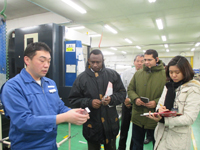
Production Kaizen in overseas operation
| Subject | Overseas manufacturing operation with over 100 employees |
|---|---|
| Issues | To build-in autonomous capability to perform Kaizen activities in the local factory |
| Summary | Perform Kaizen activities in all departments in the local factory and build-in the PDCA (Plan-Do-Check-Action) cycle. 2 to 3 days are spent every month to review Kaizen activities and provide guidance to achieve the result in 6 months. |
| Period | 6 months |
2.Human Resources Development
Expatriate training (master-class)
| Subject | Expat staff |
|---|---|
| Objective | To acquire basic knowledge necessary to act as global managers in an inclusive and systematic way. Afterwards, the staff will be sent abroad on internships so that the knowledge acquired will be turned into a more practical and embedded part of their management behavior. |
| Summary | The course will cover advanced-level English, basics of international business, basics of problem solving, etc. Management strategy, marketing, production management, BOP marketing, supply-chain management, business model studies, etc., can be added as required. |
| Program (Example) | 1. Pre-program preparation and identification of individual targets. (Include improvement of English skills, etc.) 2. Standard Off-JT program for global human resources development (problem-solving, negotiation, basics of multi-culture management, basics of international business, etc.) 3-① Elective Off-JT Program: Strategy course (global management, global leadership, etc.) 3-② Elective Off-JT Program: Practical course (multi-culture leadership, motivation and organization development, etc.) 4. Overseas internship |
| Period | About 6 months |
Expatriate training (management way)
| Subject | Expat staff |
|---|---|
| Objective | To learn the management philosophy of the company, the thinking of the president, etc. so that the participants can acquire company-specific ways of problem solving, human resource development, etc., on top of general theories. |
| Summary | Reconfirm the thinking of the president, the corporate management plan and vision. Learn about management, problem solving, financial analysis, etc., to perform current situation analysis of the company and work out how to solve underlying issues. |
| Program (Example) | 1. Orientation: Message from the president 2. Lectures and exercise: Problem solving, logical thinking, financial analysis, marketing, etc. (Inclusive of general contents as well as company-specific contents) 3. Report of the result |
| Period | About 6 months |
Expatriate training (action learning)
| Subject | Expat staff |
|---|---|
| Objective | Perform a study of one’s own company in advance to increase the level of understanding. A group discussion will be carried out followed by a visit to local sites to confirm the hypothesis. The actual solutions to issues will be reported at the end of the program can lead to a direct improvement of company profit. |
| Summary | In the pre-program study of the company, the issues of the mid-term management strategy and international businesses are examined and the results will be presented to top management. In implementing the proposed solutions, the concept and methodology of solutions will be studied in parallel. A Site inspection will be performed during the overseas training so that the usefulness of the solution can be verified. |
| Program (Example) | 1. Pre-program preparation and identification of individual targets. (Includes improvement of English skills, etc.) 2. Group-based identification of issues: Examination of mid-term management strategy, highlighting of critical issues. Presentation to top management and managers in charge. 3. Application of solutions: Monthly training sessions (lectures on problem solving, report and verification of progress) 4. Overseas internship and local research. 5. Report of the activity results and proposals for improvement. |
| Period | About 6 months |
Multi-layered training with coaching
| Subject | ① Global middle-level class managers ② Young global staff |
|---|---|
| Objective | Establish multi-layered training system to develop internal human resources capable of undertaking business abroad. To secure supply of human resources necessary to undertake overseas businesses. |
| Summary | In the first phase, acquisition of MBA-level knowledge (strategic management, financial analysis, etc.) will be targeted. In the second phase,the actual drafting of a business plan in a foreign market is required. Based on the plan, participants will collect information, conduct a market survey and adjust the plan. In the end, the final plan is presented and utilized by respective departments. Coaching is provided for every step of the program to support the learning and drafting of business plans. |
| Program (Example) | 1. Acquisition of MBA-level knowledge To learn about strategic management, organization management, financial analysis, business planning, etc. through lectures. 2. Drafting of business plan Perform domestic research to improve understanding of participants’ own company. Brush up the business plan by conducting a survey in the target country. A management consultant will follow up at each step through coaching. |
| Period | About 6 months |
Development of global leaders through action learning and private coaching
| Subject | Expat staff who will be the head of foreign operations |
|---|---|
| Objective | Improve problem solving skills by formulating inter-departmental team and conducting identification and solving of management issues. The program will also change the behavior pattern of the participants and improve management knowledge and skills. The entire process will serve to identify human resources capable of performing global operations. |
| Summary | Action Learning and operation within inter-departmental team for 1 year. Identify critical issues preventing the realization of the mid-term management strategy (principle, vision, policies) and draft the action plan in 3 months. The plan will be presented to top management and if approved, the solution will be implemented in the next 6 to 12 months. Any knowledge or skill that is required in the process will be provided as a support program. |
| Program (Example) | 1. Assessment of and targets for behavioral changes are decided (for each participant.) Multi-dimensional evaluation and coaching feedback. 2. Group-based formulation of issue(s): Evaluation of corporate vision and mid-term strategy, extraction of issues to achieve target, planning of solutions. 3. Present top management with the solution to issues: Evaluation of issues, selection of solutions to be implemented (winners) and solutions that should be modified (losers.) 4. The winners group will implement the solution. The losers group will engage in adjustments. |
| Period | 3 months for issue extraction workshop. 9 months for implementation (establishing issues, implementation, post-implementation evaluation.) |
Executive coaching
| Subject | Managers who will perform decision making and decide on direction of foreign operations |
|---|---|
| Objective | To support the change process of global staff to enable management of people in other countries or companies who have entirely different work practices and beliefs. |
| Summary | Every 2 weeks or so, a the coaching session through a teleconference via the Internet will be provided. Participants will be asked to perform self-analysis of decision making and value setting and receive advice to change in such a way to improve effectiveness in respective countries. |
| Program (Example) | Assessment Decide on how to change oneself and business issues. |
| Period | 6 months. (Based on coaching sessions twice a month) |
Global internship program
| Subject | Expat staff |
|---|---|
| Issues | To participate in an actual internship program in companies abroad to become globally-oriented staff and to become capable of achieving outstanding performances when taking up international assignments. |
| Summary | Pre-program preparation to improve English and assessment test will be conducted. Later, a pre-internship program will prepare the participants by improving their problem solving and negotiation capabilities, and by teaching them about overseas business theories. The participants will then be sent on an internship program in appropriate foreign companies for 3 or 6 months. Post-internship evaluation will also be conducted. |
| Program (Example) | 1. Pre-program learning: Attitude test for globally-oriented human resources, decision making on issues to be tackled during internship, English business writing, etc. 2. Pre-internship training: Global negotiation, adjustment to multi-cultural/global environment, international marketing, overseas business practices, international personnel management, global leadership, multi-cultural leadership, business development skills, etc. 3. Internship 4. Post-internship workshop: Sharing the results, analysis of experiences, etc. |
| Period | 3/6 months |
Cultural Detective (understanding cultural differences. In Japanese.)
| Subject | Business who will have business-related encounters with people of different cultures. |
|---|---|
| Objective | Improve capability to assess different behavior of people in different countries and also identify underlying value set that defines the behavior. This understanding will lead to improvement of work productivity in work and reduce frustration and time loss associated with mis-communication. |
| Summary | Methodology of Cultural Detective will be employed. Learn multi-cultural skills regarding target culture, cultural literacy, and cultural bridging by using country-specific textbooks as well as common textbooks to increase the effectiveness in certain predetermined countries. |
| Program (Example) | Stereotyping of cultural understanding Value lens 3 basic skills to cope with different cultures Exercises involving actual case studies Producing self-check points for coping with different cultures |
| Period | 4 hours |
 |
 |
 |
 |
 |
 |
Advanced-level manufacturing and Kaizen in local companies (to be implemented in local companies)
| Subject | Local managers and local staff engaged in the running of overseas operations |
|---|---|
| Objective | Training in Kaizen will be conducted by explaining the 3 factors of people, facility and material. Based on the topics that were set in the program, actual Kaizen activities are implemented in the workplace to embed the practice and concept in the workplace. |
| Summary | Every month, a 2-day workshop will be undertaken. For each session, lectures, practical activities, support for Kaizen activities and wrap-up session will be provided. Lectures: To provide basic knowledge in classroom setting. Practical training: What was learnt will be applied in each workplace. Later, all participants will visit the workplaces where Kaizen was applied to observe as many cases as possible in a short time. Support of Kaizen activities: The expert will give instructions so that the PDCA cycle will start in the workplaces. Wrap-up: Summarize the result of the session and provide “homework” for the next session. |
| Program (Example) | 1. Understanding 5S and apply them. Set up target of Kaizen target. 2. Understanding IE and apply it. Clarifying the target output. 3. Understanding and applying CTPM. Establish backup plan. 4. Understanding and applying MFCA. Establish backup plan. 5. Understanding and applying process analysis. Establish backup plan. 6. Understanding and applying management by objective. Wrap-up session and reporting the results. 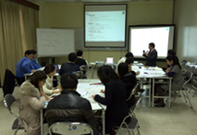 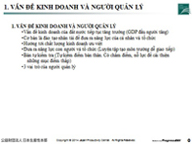 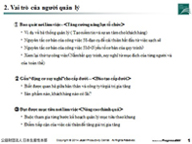 |
| Period | 6 months |
Sending Kaizen experts abroad
| Summary | The JPC sends Japanese experts to countries requesting cooperation, and provides technical guidance in production control , management renovation , and productivity improvement. As of today , our experts have been to many countries such as Malaysia , Mongolia , South Africa , Kenya , Tunisia and Taiwan. Invitation to KAIZEN |
|---|
Strengthening global operations (in Japan and overseas)
| Subject | Supply Chain Management staff in Japan, manager to be sent to overseas factory, operation manager of overseas facilities |
|---|---|
| Objective | Pre-dispatch program in Japan, local program in the local company and implementation of Kaizen activities in the overseas factory will be run in an integrated way. The experience will lead to sharing of the issues and targets between operators in Japan and overseas, and the skill level on both sides will improve. |
| Summary | 3-month pre-dispatch program: For leaders to be sent to local operations. To learn how to promote Kaizen locally and the process of problem solving. |
| Program (Example) | 3-month pre-dispatch program First month: Kick-off, 2 days of lectures and exercises on leadership, 5S, basic methods to improve productivity, problem solving, Kaizen implementation plan. Second and third month: Action Learning (Spontaneous action based on the Kaizen plan and follow-up by superior. Guidance on the floor by consultants (2 days every month.) Verification of Kaizen’s progress, methodologies to measure workplaces, review of actual Kaizen. Third month: Summary of the result (1 day) Standardization of skills. 5-month local implementation program First month: 3-day workshop for 5S and visualization, case study, drafting of implementation plan Second to fourth month: Support of guidance on the floor (2 days/month,) confirmation of progress, follow-up training, waste elimination, digitization, points regarding issues, how to summarize, etc. Fifth month: Wrap-up reporting session (1 day) |
| Period | 8 months |
Practical training of production leaders in local companies
| Subject | Local managers of overseas operations | |||||
|---|---|---|---|---|---|---|
| Objective | Develop global leaders from managers of local operations and supply-chain | |||||
| Summary | To learn MBA-level knowledge about operation management, perform Action Learning about problem solving as a leader, and learn unique behavioral patterns of the company through monthly 2-day workshops. Participants are required to perform problem solving of an issue provided by an instructor in advance, so that the Action Learning process will automatically lead to actual operation improvement. |
|||||
| Program (Example) |
|
|||||
| Period | 12 months |
Practical MBA classes in local companies
| Subject | Local managers of overseas operations | |||||
|---|---|---|---|---|---|---|
| Objective | Develop global leaders from managers of local operations | |||||
| Summary | To acquire MBA-level knowledge about operation management, Action Learning about problem solving as a leader, and unique behavioral pattern of the company through monthly 2-day workshops. Participants are required to perform problem solving of an issue provided by an instructor in advance, so that the Action Learning process will automatically lead to actual operation improvement. | |||||
| Period |
|
|||||
| Period | 12 months |
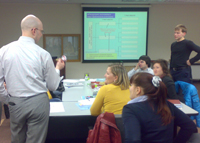
Training for local company executives
| Subject | Large- to medium-sized companies |
|---|---|
| Objective | Localization of management |
| Summary | To implement training for local company executives with the same contents and methodology as the training given to executives in Japan, so that standardization of knowledge and skills can be achieved between operations in Japan and abroad. Global pool of potential leaders can also be developed. Participants are required to perform problem solving of an issue provided by an instructor in advance, so that the Action Learning process will automatically lead to actual operation improvement. |
| Period | 12 months |
3.Checking Tools
Global (Japan + local company) performance, management, human resource check
| Subject | Overseas operations | |||||
|---|---|---|---|---|---|---|
| Objective | Check the situation of performance, management, human resources of local operations to identify human resource development(HRD) needs and actions to be taken. | |||||
| Summary | Collect information about global policies and directives, human resource situation in the headquarters and then visit local operations to conduct research. Site visits and hearings are performed locally to identify opportunities that could be exploited by improving the linkage between the HQ and local operations in HRD areas, etc. and reflect the findings in future training programs. The results of the above procedures will be reflected in workshops to be held both in Japan and the local country so that promotion of awareness and global standardization can take place. | |||||
| Program (Example) |
|
|||||
| Period | 2 to 6 months |
Global human resource management level check (with METI survey data)
| Subject | Japanese companies |
|---|---|
| Summary | To measure the extent of globalization of the client company’s human resource management by utilizing the assessment indexes and statistical data of the METI (Ministry of Economy, Trade and Industry of Japan) survey on globalization of HRD. |
| Program (Example) | 1. Input data into questionnaire of globalization of HRD. 2. Hearing with relevant staff of the client company. Topics of the hearing: Outline of current HRD system Mid- to long-term management policies and goals and requirements of HRD. Verification and questions regarding some of the answers to the questionnaire. 3. To provide charts that compare the client company’s situation with other sample companies of the survey and proposals reports on HRD system and implementation approximately 2 weeks after completion of above hearing. |
| Period | 1 to 2 months |
APICS CPIM/CSCP certification examination and training
 |
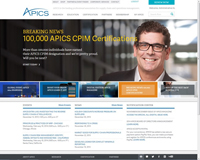 |
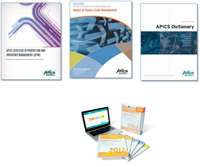 |
| Subject | Staff who are associated with SCM (supply-chain management) in any domestic/international operations |
|---|---|
| Objective | Introduction of global standard into SCM |
| Summary | APICS is the world’s largest research and SCM promotion body of SCM that administers the certification test for SCM professionals all over the world. There are over 100,000 professionals that have APICS SCM certifications of CPIM (basic level certification) and CSCP (advanced level certification.) CPIM certification is to certify the knowledge level of global SCM and is composed of 5 subject areas. CSCP is the advanced level certification for managers. |
| Program (Example) | Basics of SCM ・Introduction ・Demand management/Master plan ・Capacity management/Production management ・Total inventory management/Item-based inventory management ・Purchasing/Logistics ・Lean/JIT, quality system ・Theory of Constraints/Review |
| Period | Schedule of the tests (4 periods per year) March-May, June-July, August-September, November-December (Global standard based on CBT method) |
| http://www.apics.org/ http://apics.jp/ |
ES survey for English & Vietnamese workers
| Summary | Web-based attitude survey in Vietnamese. Basic questions are composed of 63 items in 13 areas. Periodical implementation can be considered. An expert consultant can perform analysis to clarify the issues to be solved. |
|---|---|
| Basic questions | Company-related issues ①Undestanding Corporate ②Working hours, Leaves ③Evaluation, Promotion ④Wages ⑤Job Assignment, Allocation ⑥Supervision ⑦Relation with Colleages ⑧Relation with Other Department ⑨Physicla Work Environment ⑩Motivation, Job Enrichment ⑪Work Load ⑫Relation with Customers ⑬Career Development |



